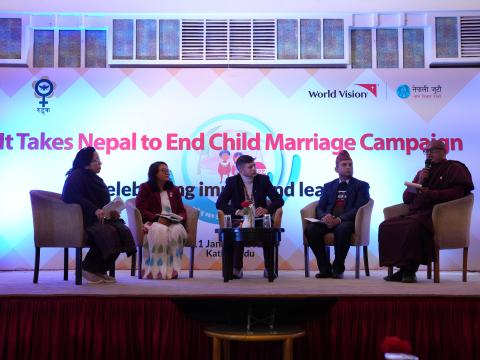'It Takes Nepal to End Child Marriage' campaign amplifies efforts to reach 2030 goals

In collaboration with the Government of Nepal and various CSO actors, World Vision International Nepal (WVI Nepal) concluded its six-year campaign, ‘It Takes Nepal to End Child Marriage’, through an event in Kathmandu today. The event was attended by child rights experts and like-minded stakeholders and included a session on national-level policy dialogue discussing the roles and responsibilities of the government, civil society organisations, and national and international NGOs alike, to eliminate child marriage in Nepal by 2030. The government of Nepal has a target to end child marriage as outlined in the National Strategy on Ending Child Marriage 2016, aligning with the Sustainable Development Goals. Over the past 6 years, the campaign has reached over 400,000 children and successfully collaborated with different levels of government in 6 provinces to formulate 44 policies related to ending child marriage, indicating that positive commitment in addressing this issue is being observed.
The closing event of 'It Takes Nepal to End Child Marriage' campaign was chaired by Honourable Dr. Arzu Rana Deuba with participation from various ministries including Ministry of Women, Children and Senior Citizens, along with various national and international organisations working to end child marriage in Nepal. Findings from research conducted by World Vision was shared along with stories from children impacted by the campaign and a Policy Brief launched by Joining Forces, a network of child-focused agencies committed to ending child marriage. Speaking at the event, Honourable Minister Surendra Raj Acharya said, “Child marriage is a criminal act and robs children of their rights. Grassroots level awareness is key to stopping child marriage in the communities, at the same time a common effort of all stakeholders is required to end child marriage in our community”.
The chair for the event and parliamentarian Dr. Arzu Rana Deuba, shared her commitment to continue to work on issues relating to children, specifically on girls and women. While she also added that social awareness is not enough to end child marriage as targeted by the government of Nepal, implementation of policies is also key to ending child marriage. At the same time, the child representative and member of National Child Advocate Council Prekshya Adhikari shared about the importance of child participation across all levels of decision making as well as implementation of programs relating to children.
The campaign ‘It Takes Nepal to End Child Marriage’ started in Nepal in August 2017 through a formal launch by the then Rt. Honourable President Bidya Devi Bhandari with an aim to bring impact through the campaign with a specific focus on strengthening systems, changing behaviours of children, adolescents and their family and influencing effective implementation of policy.
Roslyn H. Gabriel, the National Director of WVI Nepal highlighted the importance of efficient collaboration between government and non-government agencies to eliminate child marriage in Nepal by 2030.
Gabriel shared, "The campaign brought together more than 65 partners in the federal, provincial and local level to join hands in declaration of 11 Child Friendly Local Governments and has been able to directly prevent 561 Child marriages throughout WVI Nepal’s working areas. The campaign covered 46 municipalities in six provinces of the nation where 24 rural municipalities and municipalities formed ending child early and forced marriage strategy/plan/procedures, and 10 rural municipalities and municipalities have already endorsed and implemented the strategy in their respective municipalities. However, our effort should not end here, while there has been progress made, almost 1 in 3 children still marry before the age of 18 years in Nepal and the issue requires sustained focused attention. World Vision will continue its commitment and urges the government as well as all stakeholders to keep the momentum alive towards the efforts of ending child marriage.”
Dibya, a child club member and anti-child marriage campaigner added, “We’re working to stop child marriages in our village, and we are making parents aware of the issues caused by child marriage and the laws against it. However, many of the families that marry their daughters early in our community do so because of financial constraints – sons are sent to India to find work, and girls are married.”
Dibya is a child marriage survivor who is now actively engaged in stopping child marriage in her community with support from World Vision and its implementing organisations.
Though the campaign has come to an end, the issues surrounding child marriage and child rights will continue to be a priority of work for World Vision. World Vision will continue to improve the well-being of 0.8 million children, in particular the most vulnerable ones by 2025 through its work on education, health, nutrition and WASH, disaster risk reduction, child protection, and livelihood.
For further information, contact:
Pratistha Koirala
Senior Communications Manager, World Vision International Nepal
Email: pratistha_koirala@wvi.org